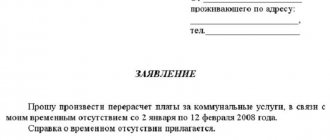Communal apartment: definition, categories of residents
A communal apartment is a property consisting of several residential premises that belong to several owners. As a rule, several families live in an apartment and share common areas: kitchen, hallway, bathroom, toilet.
The law allows that both the owners of their share and tenants can live in an apartment at the same time. Each party has the right to own and use its territory, and the owners can also dispose of the property (Article 30 of the Housing Code of the Russian Federation).
Rights of each household in a communal apartment
Persons who own residential premises in a communal apartment have the right to live in them independently or rent them out. At the same time, the consent of neighbors to move in third parties under the lease agreement is not required. If necessary, they can register tenants in housing.
If you receive housing under a social tenancy agreement, it will be more difficult to rent out your territory. To do this, a number of requirements must be met:
- compliance with living space standards (12 square meters per person);
- written consent of the landlord;
- consent of neighbors in a communal apartment.
Both owners and tenants can accommodate tenants free of charge. The consent of other parties is not required. This rule also applies to guests. In the Rules for the Use of Residential Premises there are no restrictions on the number of guests and the time of their stay. They can use common spaces in a communal apartment on the same basis as owners or tenants. However, their period of residence without registration should not exceed 90 days.
All residents have the same rules for living in a communal apartment. The law does not provide privileges to either party.
Neighbors when living in a communal apartment
Neighbors in communal housing are equal users. As a rule, if they are the owners, they have the right to sell the premises they own. At the same time, neighbors have the right to purchase this premises on a priority basis in the first month after the announcement of the sale.
That is, the owner selling premises in a communal apartment must first inform his neighbors about this, and then look for buyers on the side.
The rule regarding co-owners of indivisible property applies here. In this sense, a communal apartment is considered as a single property that is not subject to division.
Public areas: rights and responsibilities
Each party has the right to use the common territory. By default, you can place furniture or other items on it, but so as not to infringe on the rights of other residents. The common area must not be cluttered. Common property is not subject to sale. All residents have the same rights.
When selling his share in the apartment, the seller is deprived of the right to use the common premises. All issues related to the common territory are resolved through the court.
Repairs to common property are the responsibility of all parties. The decision to carry out repair work can be made by the owners of shares or attracted experts. Upon completion of the work, an estimate is drawn up. Each owner of the premises in the apartment pays for repairs in proportion to his share. If a party refuses to pay, money for repairs is collected through the court.
Noise
Silence mode is set from 23:00 to 07:00. During this period, the noise should not exceed 45 decibels, which is typical for a calm conversation. If the noise level is disturbed, neighbors have the right to call the police. During the day, residents have the right to increase the noise level to 55 decibels. The claims of other parties against them are not legal (Civil Code of the Russian Federation).
Actions that disturb the silence at night in a communal apartment are:
- to the use of radios, amplifiers, tape recorders, televisions when the noise level is exceeded;
- to playing musical instruments, singing and shouting;
- to carry out repair and construction work using powerful tools, resulting in increased noise generation;
- to the use of pyrotechnics;
- other actions that disturb the silence.
A fine of up to 2,000 rubles may be imposed on the violator.
Smoking
There are no laws prohibiting smoking in communal apartments. However, it is forbidden to use public places for smoking, since neighbors are forced to “inhale the smoke of smoldering products” (Federal Law No. 87 “On restricting tobacco smoking”). Neighbors may try to sue the smoking residents or call the local police officer for an instructive conversation.
Animals
The rules for living in a communal apartment with animals are not reflected in Government Resolution No. 25 “On approval of the Rules for the Use of Residential Premises.” Previously, cats and dogs were allowed to stay only with the written consent of all residents. Now there is no such norm. Owners and tenants can keep animals on their property if their neighbors have no contraindications to them. Otherwise, their consent is required.
It is worth noting that animal owners bear full responsibility for sanitary and hygienic cleanliness. If the rights of other parties are violated when animals live in a communal apartment, for example: a dog barks at night, then they can go to court.
Cleaning
This procedure is regulated by the norms of the Housing Code of the Russian Federation and the Civil Code of the Russian Federation. The rules for living in a communal apartment, the “code of responsibility” for which is enshrined in law, only complement these regulations.
Each tenant is obliged to bear the financial burden for maintaining the property of the apartment (Article 43 of the Housing Code of the Russian Federation). The Civil Code only adds that liability must be proportional to the share in the common property.
When cleaning common areas, the number of residents in each room and the owner’s share in the apartment are taken into account. In practice, cleaning is carried out according to a set schedule.
Putting things in order
Residents of communal apartments are required to constantly clean. Each room must always be kept in perfect order, the room must have a clean and tidy appearance. Responsibility is established by the housing code standards, which state that neighbors are assigned a specific obligation to clean the premises.
Residents of a communal apartment set their own cleaning schedule. The order of priority is determined by the general meeting of residents. Moreover, everything written in the room must be taken into account. The order of duty is established jointly.
Each tenant, according to the Housing Code, is responsible with his own funds for the maintenance of all property in the room. The amount of money is directly proportional to the size of the share of property owned by the owner of the premises.
Payment of utility services
Residents pay utility bills in proportion to their share in the common property.
Option 1 - there are no individual metering devices. In this case, it is carried out by agreement of the parties, for example: depending on the occupied area or the number of residents.
Option 2 - there are metering devices. Each party pays for services according to their own meters, and utilities for the use of the common territory are distributed by agreement.
If the neighbors have not found a compromise, then the rules for paying for services are as follows:
- payment for heating is made in proportion to the share in the property of the apartment;
- payments for water and gas are distributed based on the number of occupants and guests who occupy the premises for more than one month;
- electricity is paid based on the power of the device in each room and their number;
- The item “Maintenance and repair” is paid based on the actual premises(es) and the share in common areas.
The legislation does not establish the obligation of residents to pay utility bills for an unscrupulous, defaulting neighbor.
Redevelopment
The property of a communal apartment is common property, therefore redevelopment is possible only with the consent of all owners and tenants. Moreover, their gesture of goodwill must be formalized in writing and notarized. Otherwise, such an act will result in a hefty fine and a requirement to return the housing to its former configuration.
Neighbors' permission alone is not enough. Permission from the relevant authorities will be required. To obtain it, you must prepare a sketch of the redevelopment and documents confirming ownership of the share. Redevelopment will be refused if it affects load-bearing walls.
Where is smoking allowed?
Current legislation provides for restrictions on smoking cigarettes in public places. In other words, by default this is only allowed in your own room. Such actions are strictly prohibited on public territory.
If your neighbors happen to be smokers, you are allowed to smoke in separate rooms that they have agreed upon with each other. Fire safety rules must be observed in this area.
Note that the current regulations regarding communal apartments do not mention smoking anywhere. However, if a smoker creates uncomfortable living conditions for neighbors, they still have the right to demand that they stop smoking.
If a neighbor ignores these requests, residents can ask the local police officer for help. Of course, this option is best used only as a last resort. Lawyers advise resolving the issue peacefully without involving law enforcement agencies.
How to sell your share: general rules
Here you cannot do without Article 250 of the Civil Code of the Russian Federation. In accordance with it, the priority right to purchase a share is given to neighbors in the communal apartment. If they refuse this privilege, they must provide a written refusal. This document is required to register a transaction for the alienation of property.
Sometimes neighbors do not want to buy a share and do not grant a waiver. In this case, it is necessary to send them written notices certified by a notary. A neighbor is considered not to have been notified unless notice is given to him. Failure to respond within a month after receipt of the document is interpreted as a refusal.
If the owner of the premises in a communal apartment is a minor, then the refusal is granted only with the consent of the guardianship and trusteeship authorities.
There is no need to notify neighbors about the sale of a share if the buyer is the owner of a communal apartment.
If the seller has not notified other owners, he may be refused registration of the transaction. A transaction carried out without notifying neighbors can be challenged in court within one month from the date of sale of the property.
If a neighbor missed the deadline for challenging the transaction for valid reasons, then he can challenge the sale under Article 205 of the Civil Code of the Russian Federation. The rights and obligations of the buyer will be transferred to him and a corresponding entry will be made in the State Register. Read more about selling a room in a communal apartment here.
Rights to obtain a vacant room
In the event that the tenant of leaves the room under a social tenancy agreement certain categories of citizens apply for his place .
In accordance with Art. 59 Housing Code of the Russian Federation, categories of applicants in descending order:
- low-income families;
- persons standing in line for improved living conditions;
- a citizen who planned to buy this room under a sales contract.
Read about how to obtain a state certificate for improving housing conditions here.
Since the vacated area goes back to the municipality , only this body decides who to give it to.
If the owner of a room in a communal apartment decides to sell , then the first thing he must do is offer to buy the premises to his neighbors . They are the ones who have the privilege of purchasing in this case.
If they do not want to make a purchase, they must write a refusal of the offer .
If you do not convey information about the sale to your neighbors, your transaction may be challenged and cancelled.
Follow the law and the sale will go smoothly.
If you are selling a room to another owner of a communal apartment, then you don’t have to notify .
If there are no persons claiming the room, then the share can be bought by neighbors at the market price . If among them there is no person willing to purchase part of the communal apartment, then it will be offered to other persons who want to purchase housing.
A sample notice of the sale of a share in a communal apartment and the neighbor’s refusal of the pre-emptive right to purchase.
How to get a vacant room in a communal apartment is described in the video:
Subtleties of premises privatization
Privatization applies only to premises rented under a social tenancy agreement. The tenant can transfer one or more premises into his own ownership, but not the communal apartment as a whole.
To carry out privatization, the consent of all family members will be required. If at least one of them does not want to become an owner, then he must provide a notarized refusal.
If minor children live in the room, then the consent of the guardianship and trusteeship authorities will be additionally required. Their decision depends on arguments in favor of the interests of the child. The following requirements must be met:
- the child will be provided with housing equivalent to the previous one;
- sanitary and hygienic requirements will be met at the new location.
During privatization, the consent of neighbors is not required.
What to do with troublemakers
The rules of living in a communal apartment and the fight against violators are closely interrelated. Every person has the right to protect his interests in the sphere of life and activity (Constitution of the Russian Federation).
If it is impossible to resolve the problem peacefully, the only option to resolve the problem is to file a lawsuit. The concept of a negative claim is associated with communal apartments. It occurs when the rights of residents to common areas are violated. When a court verdict is issued, bailiffs will monitor the fulfillment of obligations under it.
As for silence, you should contact law enforcement agencies. It is advisable to send your request in writing. The competence of these bodies also includes issues related to smoking in public places, storage of toxic substances, damage to property, etc.
In case of illegal redevelopment that threatens the integrity of the house structure, residents can contact the BTI.
According to statistics, about 18% of citizens still live in communal apartments. It is wiser to build relations with neighbors on a friendly note, since legal proceedings will only escalate the situation.
What is considered common?
Common areas in a communal apartment are sanitary facilities (toilet, bathroom), hallway, storage room and kitchen. At the same time, a balcony and a loggia, which are located in a room that belongs to someone, do not belong to public places, and only the owner of this room has the right to use them.
Dear readers!
Our articles talk about typical ways to resolve legal issues, but each case is unique. If you want to find out how to solve your specific problem, please contact the online consultant form on the right →
It's fast and free!
Or call us by phone (24/7):
If you want to find out how to solve your particular problem, call us by phone. It's fast and free!
+7 Moscow,
Moscow region
+7 Saint Petersburg,
Leningrad region
+7 Regions
(toll-free call for all regions of Russia)
Common premises are an issue that is relevant not only for neighbors of communal apartments, but also for any jointly owned housing, including municipal housing. In particular, the issue of public places is especially acute for those who only intend to apply for free or paid privatization.
According to the law, it is allowed to privatize not the entire apartment, but only part of it, a room or several rooms. In fact, it is not possible to allocate part of the total area in kind, especially when there are not two, but more owners. However, by default, the owner is allocated a part of the total area commensurate with the share of the apartment that belongs to him. That is, if a person owns a room that occupies half or a third of the apartment, then he will be allocated half or a third of the kitchen, hallway, bathroom, pantry, and so on.






